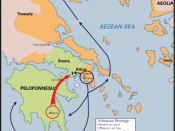Contemporary Thinkers: Plato, Aristotle, Augustine, AquinasQuestion #1 : Please discuss the political organization of the Greek city-states, particularly Athenian democracy at the time of Pericles, Plato, andAristotle. Also discuss the backgrounds of Socrates, Plato and Aristotle andthe fate of the Greek city-states historically.
During the time of Pericles, Plato, and Aristotle, Greece was dividedinto city-states with a wide variety of constitutions, ranging from Sparta'smilitary dictatorship to Athens' direct democracy.
Most city-states had about 300,000 people, each divided into one ofthree classes : citizens, metics, or slaves. The citizens represented a totalof one - third the population. The members of this class participated directlywith politics in the various institutions, and decisions were derived by popularvote, known as direct democracy. This class was further divided into threecouncils : Assembly of Ecclesia, Council of 500, and the Council of 50. Thelargest council was the Assembly of Ecclesia, which was a body of all malecitizens over the age of twenty.
The Council of 500 consisted of 500 members,chosen from lottery and election from the Assembly of Ecclesia. The Council of50 was made up of 50 members chosen from the Council of 500. The second classof people in the city-states was the Metics. This class was made up of peoplethat were not citizens, either because they were not born in the city-state, orthey were prevented from being citizens. The third class were the slaves.
These people were captured from wars and subject to serve the city-state withoutpay. The interesting observation in the organization of the Greek city-state isthat only one-third the population had any power. The other two thirds (made upof meti cs and slaves) were subject to the decisions derived by the citizens, andcontained no power nor voice in the political system. Athenian Democracy hadsuch a division of classes. This democracy had a...


